Daily Vocabulary Words: List of Daily Used Words in Leading Indian Newspapers
Hi there. Welcome to this special section @ Wordpandit. Our endeavour here is straightforward: highlighting daily vocabulary words that you would come across in leading newspapers in the country. We have included the following newspapers in our selection:
• The Times of India
• The Economic Times
• Hindustan Times
• Mint
• Indian Express
We are putting in extensive work to develop your vocabulary. All you have to do is be regular with this section and check out this post daily. This is your repository of commonly used words; essentially, we are posting a list of daily used words. Hence, this has significant practical application as it teaches you words that are commonly used in leading publications mentioned above.
Visit the website daily to learn words from leading Indian newspapers.
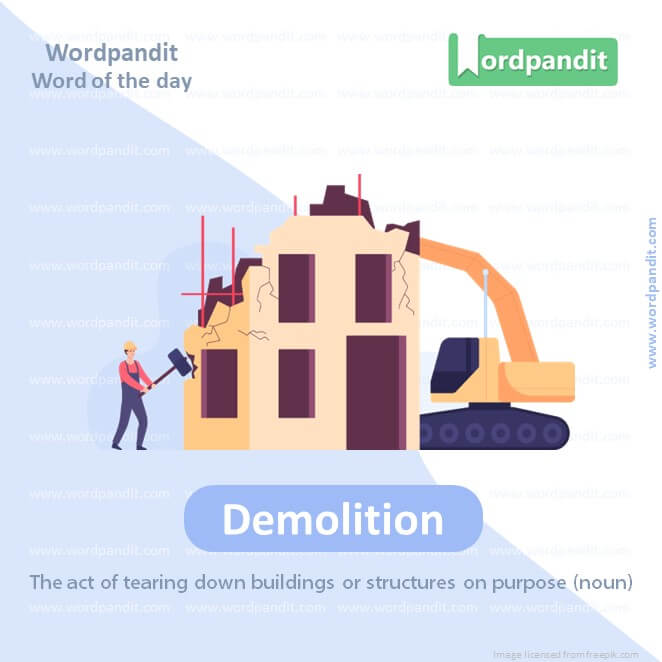
WORD-1: Demolition
CONTEXT: Unlike in Ayodhya, however, there is historical evidence to contend that at both Gyanvapi mosque and in Mathura, Aurangzeb ordered the demolition of temples held as symbols of rebel authority (local Jat chiefs Gokul and Raja Ram in Mathura), or had been traditionally associated with those believed to collaborate with rebels.
SOURCE: Hindustan Times
EXPLANATORY PARAGRAPH: Imagine you have a big tower of blocks, and then you knock it down with a big swing of your arm. That knocking down is like “demolition.” It’s when buildings or structures are purposely destroyed to clear space for something new or just to get rid of them.
MEANING: The act of tearing down buildings or structures on purpose (noun).
PRONUNCIATION: dem-uh-LISH-un
SYNONYMS: destruction, wrecking, razing, dismantling, tearing down
USAGE EXAMPLES:
1. The old factory is scheduled for demolition next week.
2. They watched the demolition of the building with fascination.
3. Demolition crews were clearing the site for new construction.
4. The demolition process was carefully planned to avoid damage to nearby structures.
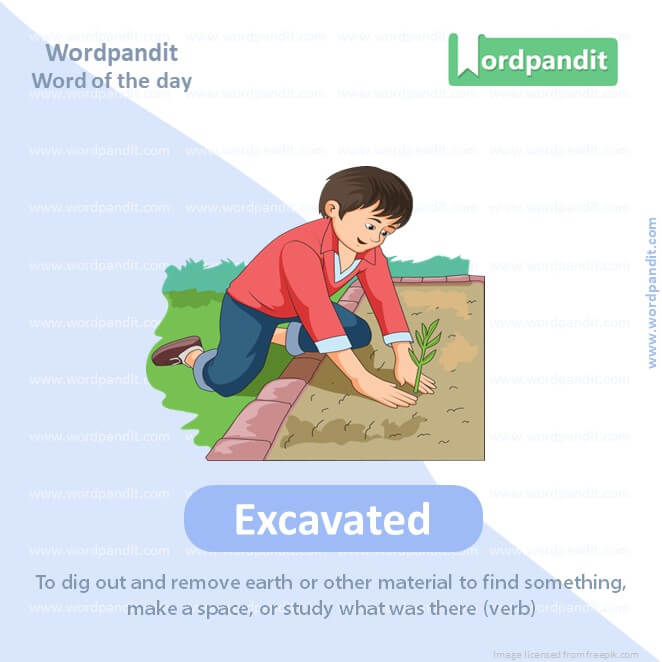
WORD-2: Excavated
CONTEXT: Thus, the Gyanvapi mosque-Kashi Vishwanath temple area has not been excavated by the ASI so far.
SOURCE: Hindustan Times
EXPLANATORY PARAGRAPH: Imagine you’re at the beach, digging in the sand with your shovel to make a big hole or find buried treasure. That digging and making a hole is what “excavated” means. People do this to find things underground like dinosaur bones or old pieces of buildings from a long time ago.
MEANING: To dig out and remove earth or other material to find something, make a space, or study what was there (verb).
PRONUNCIATION: EK-skuh-vay-tid
SYNONYMS: dug out, unearthed, mined, quarried, hollowed out
USAGE EXAMPLES:
1. Archaeologists excavated the site and found ancient artifacts.
2. They excavated a large hole to build the foundation of the house.
3. Excavated materials were carefully sifted for historical objects.
4. The team excavated the area where the old temple was believed to be.
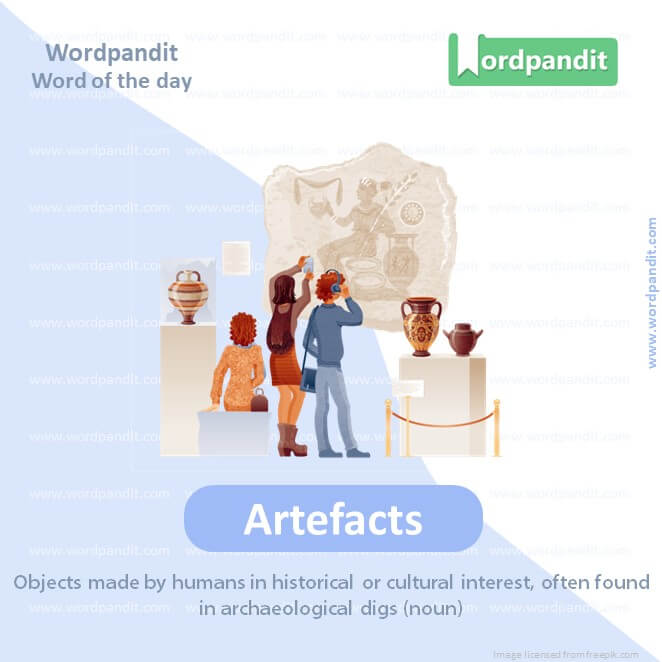
WORD-3: Artefacts
CONTEXT: In its recent survey, the ASI on the basis of the study of the structure, exposed features and artefacts, concluded the existence of a temple.
SOURCE: Hindustan Times
EXPLANATORY PARAGRAPH: Think about finding a really old toy hidden in your backyard that used to belong to someone a long time ago. That old toy is like an “artefact.” Artefacts are things made by people in the past that we find today. They can be anything from tools, toys, to pieces of pottery that help us learn about how people lived a long time ago.
MEANING: Objects made by humans in historical or cultural interest, often found in archaeological digs (noun).
PRONUNCIATION: AHR-tuh-fakts
SYNONYMS: relics, antiquities, treasures, remains, historical objects
USAGE EXAMPLES:
1. The museum’s collection includes artefacts from ancient Egypt.
2. Artefacts discovered at the site provide clues to the area’s past.
3. They carefully preserved the artefacts for future study.
4. Some of the artefacts date back thousands of years.
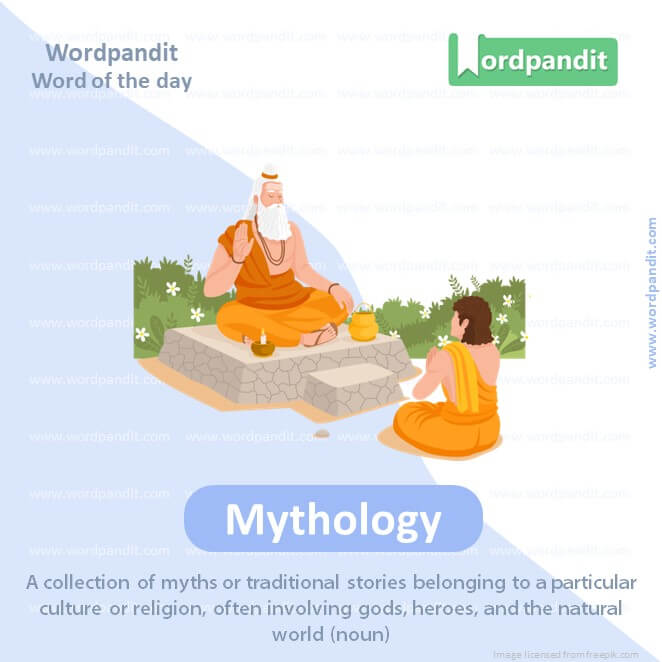
WORD-4: Mythology
CONTEXT: In Mathura, an equally ancient city, the first recorded archaeological exploration began in 1836 with the discovery of a sculpture that is believed to be of Silenus from Greek mythology.
SOURCE: Hindustan Times
EXPLANATORY PARAGRAPH: Think about your favorite stories with powerful gods, magical creatures, and incredible heroes going on big adventures. These stories are part of “mythology,” which are tales from long ago that people told to explain the world around them, like why the sun rises or why seasons change. Every culture has its own mythology, full of exciting stories.
MEANING: A collection of myths or traditional stories belonging to a particular culture or religion, often involving gods, heroes, and the natural world (noun).
PRONUNCIATION: myth-AWL-uh-jee
SYNONYMS: folklore, legends, fables, lore, mythic tales
USAGE EXAMPLES:
1. Greek mythology includes gods like Zeus and heroes like Hercules.
2. She studied the mythology of ancient civilizations for her project.
3. Norse mythology is known for its tales of Odin and Thor.
4. Mythology often explains natural phenomena through stories.
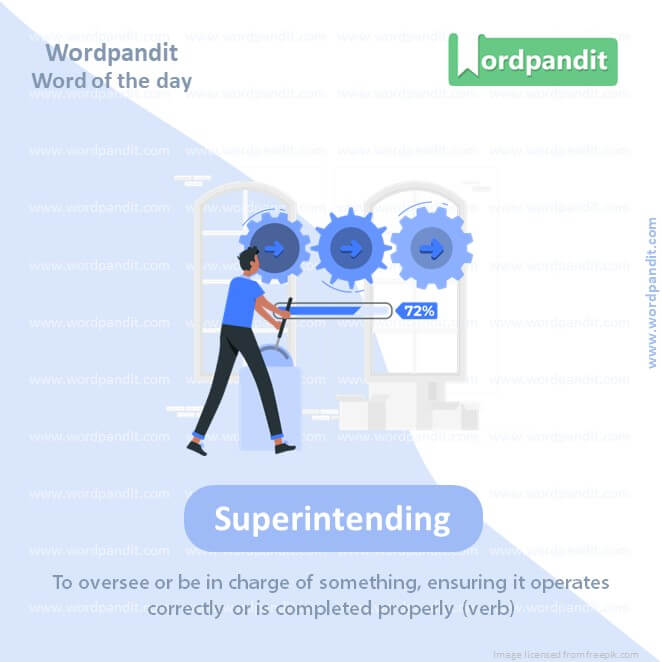
WORD-5: Superintending
CONTEXT: In its recent RTI reply the ASI’s superintending archaeologist, Agra circle says, “portions of Katra mound which are not in the possession of nazul tenants [nazul land is property belonging to the government] on which formerly stood a temple of Keshavdev which was dismantled and the site utilised for the mosque of Aurangzeb.”
SOURCE: Hindustan Times
EXPLANATORY PARAGRAPH: Imagine you’re in charge of making sure everyone in your group project does their part correctly, and the project turns out great. That’s like “superintending.” It means to be in charge of something and make sure everything is going right, like a teacher watching over a class or someone making sure a building is made the right way.
MEANING: To oversee or be in charge of something, ensuring it operates correctly or is completed properly (verb).
PRONUNCIATION: soo-pur-IN-tend-ing
SYNONYMS: supervising, managing, overseeing, directing, administering
USAGE EXAMPLES:
1. He was superintending the construction of the new bridge.
2. The principal is superintending the school’s renovation efforts.
3. She superintended the team to ensure the project met its deadline.
4. As the event coordinator, he was superintending all aspects of the event.
WORD-6: Cryptic
CONTEXT: In this somewhat cryptic reply, there’s no mention of there being a birthplace temple of Lord Krishna.
SOURCE: Hindustan Times
EXPLANATORY PARAGRAPH: Imagine your friend gives you a secret note with a message that’s hard to understand, like a puzzle. That message is “cryptic.” It’s when something is written or said in a way that’s mysterious or confusing, and you have to think hard to figure out what it means.
MEANING: Being mysterious or unclear, often intentionally to hide the true meaning (adjective).
PRONUNCIATION: KRIP-tik
SYNONYMS: mysterious, enigmatic, obscure, puzzling, ambiguous
USAGE EXAMPLES:
1. The message was cryptic, and they spent hours trying to decipher it.
2. His instructions were too cryptic to understand at first glance.
3. She received a cryptic note that left her puzzled.
4. The book is full of cryptic references that only a few understand.
WORD-7: Stupas
CONTEXT: Therefore it is averred in various ASI surveys that a Buddhist monastery or sanctuary existed on the Katra mound and was present till the middle of the 7th century when the Chinese traveller Hiuen Tsang noted the presence of Buddhist stupas and 2,000 resident monks along with five Brahmanical temples.
SOURCE: Hindustan Times
EXPLANATORY PARAGRAPH: Imagine a special kind of tower with a rounded top that’s not just for looking pretty but is very important to some people who follow Buddhism. These towers are called “stupas,” and they are built to hold important items or to remember special teachings. People visit stupas to think quietly, offer flowers, and feel peaceful.
MEANING: Dome-shaped structures erected as Buddhist monuments, often containing relics and used as a place of meditation (noun).
PRONUNCIATION: STOO-pahs
SYNONYMS: shrines, monuments, reliquaries, pagodas, temples
USAGE EXAMPLES:
1. The ancient stupa was visited by pilgrims from all over the world.
2. They circled the stupa as part of their meditation practice.
3. The stupa stood as a symbol of enlightenment.
4. Stupas are important architectural features in Buddhist countries.
WORD-8: Juggernaut
CONTEXT: Only the judiciary can stop this communalised digging of the past from becoming a juggernaut that will surely turn India, a land of confluence into a land of conflict.
SOURCE: Hindustan Times
EXPLANATORY PARAGRAPH: Imagine a huge, unstoppable truck driving through a movie scene, crushing everything in its path. That’s like a “juggernaut.” It’s something so powerful and unstoppable that it seems like nothing can stand in its way, whether it’s a real big truck or just a very strong team in a competition.
MEANING: A massive, unstoppable force or institution that crushes whatever is in its path (noun).
PRONUNCIATION: JUG-er-nawt
SYNONYMS: powerhouse, behemoth, colossus, steamroller, titan
USAGE EXAMPLES:
1. The company became a juggernaut in the tech industry.
2. Their team was a juggernaut, winning every match.
3. The film was a box office juggernaut.
4. He moved through the competition like a juggernaut.
WORD-9: Holistic
CONTEXT: Climate budgeting is not only a way of mobilising finance but also works efficiently to ensure holistic planning and immediate implementation of climate action. Every decision a city undertakes must be evaluated and aligned with climate targets.
SOURCE: Hindustan Times
EXPLANATORY PARAGRAPH: Imagine you’re painting a big picture, and instead of just focusing on one small part, you make sure everything in the whole picture works together beautifully. That’s like thinking in a “holistic” way. It means looking at everything all together, not just one part, whether it’s taking care of your health, solving a problem, or making something.
MEANING: Considering the whole of something or someone and not just a part, especially when considering health or treatment (adjective).
PRONUNCIATION: ho-LIS-tik
SYNONYMS: comprehensive, all-inclusive, integrated, total, all-encompassing
USAGE EXAMPLES:
1. The doctor takes a holistic approach to medicine.
2. She believes in a holistic lifestyle, combining diet, exercise, and mental health.
3. The program offers a holistic understanding of history.
4. Holistic therapies often include both physical and emotional health.
WORD-10: Peers
CONTEXT: Mumbai’s 2024-2025 annual budget allocation is ₹59,954 crore, a 10% increase from last year, and gives the city an advantage over peers in implementing climate targets.
SOURCE: Hindustan Times
EXPLANATORY PARAGRAPH: Imagine all the kids in your class are working on a project together. Everyone is the same age and trying to do their best. These kids are your “peers.” It means people who are the same age as you or in the same situation, like classmates or teammates, who you see and work with often.
MEANING: Individuals of the same age, status, or ability, often used to describe a group of people who are equals in some way (noun).
PRONUNCIATION: PEERZ
SYNONYMS: equals, contemporaries, colleagues, comrades, counterparts
USAGE EXAMPLES:
1. She was respected by her peers in the industry.
2. He found it difficult to get along with his peers at school.
3. The study compares the behavior of teens with their peers.
4. She stood out among her peers for her exceptional talent.
vocabulary building in english
The prowess of a language learner is often evaluated by their command over vocabulary. Undeniably, vocabulary building in English is of paramount importance when it comes to mastering the language. Not only does it enrich communication skills but also boosts confidence and comprehension levels. So, how can one truly succeed in vocabulary building in English?
One of the significant aspects of vocabulary building in English is recognizing your existing lexicon’s confines. The evaluation helps set definitive goals towards the expansion of your vocabulary. Subsequently, immerse yourself in English content, be it books, news articles, podcasts or movies. This immersiveness provides exposure to new words, their usage, and context, crucial elements in vocabulary building.
Now, you have identified new words, but how do you retain them? The key is reiteration and practical application. Adopt a habit of daily revision and try using the words in your conversations or writings. Don’t fear mistakes, for they are stepping stones to the proficiency you desire in vocabulary building in English.
Next, understanding the structure of the English word, utilizing the roots, prefixes, and suffixes, can significantly elevate your vocabulary building endeavor. This strategy aids in decoding a word’s meaning and can prove instrumental in expanding your word arsenal. Remember, languages often borrow words from each other, grasping these borrowed words’ roots can substantially simplify vocabulary building in English.
Lastly, incorporating fun into learning can stimulate progress. Engage in crossword puzzles, word games, or digital apps like Duolingo or Quizlet. These platforms not only provide a fun-method to reinforce new words but also help track your progress in vocabulary building in English.
To sum up, the journey of vocabulary building in English must begin from self-evaluation, proceed with content exposure, practice, decoding, and end in a fun-oriented learning approach. The intricate layering of these methods helps you unlock the essence of this globally spoken language. Remember, the process may seem tedious initially, but with time and practiced techniques, the task of vocabulary building in English will become effortless and rewarding.













